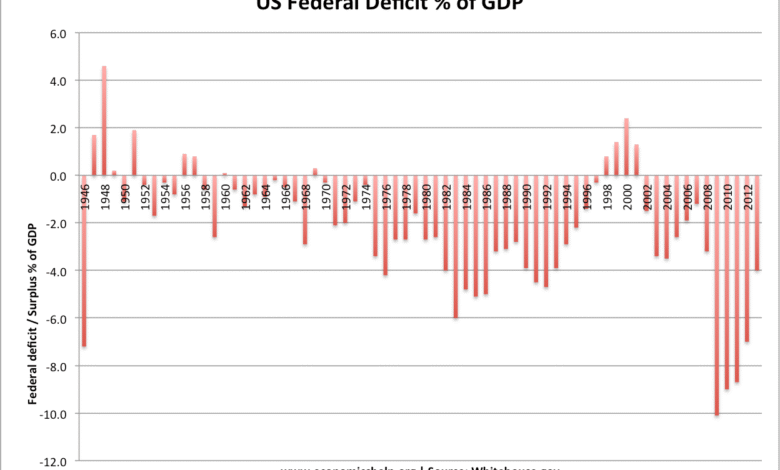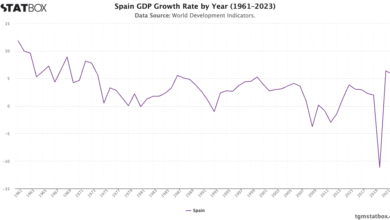U.S. Fiscal Deficit Forecast: Decline Expected in 2025

The U.S. fiscal deficit remains a topic of intense scrutiny as the International Monetary Fund (IMF) forecasts an expected dip to 6.5% of gross domestic product (GDP) in 2025, down from 7.3% in the previous year. This anticipated decline is largely attributed to the increase in tariff revenue, as the U.S. grapples with the economic implications of rising trade tensions and inflationary pressures. As policymakers navigate these turbulent waters, the impact of tariffs on the overall U.S. debt is crucial, as it can both alleviate and exacerbate financial constraints. The IMF’s report highlights uncertainty surrounding these prospects, especially concerning the effects of a potential trade war on economic growth. Understanding the fiscal dynamics involves not only analyzing revenue streams but also the broader implications of changes in consumer behavior due to heightened tariffs and pricing adjustments.
In discussing the financial health of the United States, terms like budget shortfall and government deficit come to the forefront, especially as projections indicate a decrease in these figures. The International Monetary Fund (IMF) recently discussed the influence of increased customs duties on the nation’s financial landscape, revealing that tariff revenues might lead to a narrower gap between expenditures and income. With projected reductions in the deficit tied to these new tariffs, the complexities of national debt and their implications for economic stability are paramount. As the trade war unfolds, its repercussions on growth and fiscal policy will be closely analyzed to gauge their long-term effects on U.S. fiscal management. As various strategies are contemplated, vigilance in monitoring revenue generation is key to ensuring the sustainability of economic progress.
IMF Forecasts and the Future of the U.S. Fiscal Deficit
The International Monetary Fund (IMF) has made notable forecasts regarding the U.S. fiscal deficit, projecting a decrease to 6.5% of the gross domestic product (GDP) by 2025. This marks a slight improvement from the expected 7.3% in 2024. The reduction is largely attributed to an anticipated rise in tariff revenues as a response to ongoing economic adjustments and trade war strategies. Tariffs, primarily aimed at foreign imports, are seen as a method for the U.S. to bolster its financial standing and decrease its debt-to-GDP ratio.
Despite the optimistic forecasts, there are significant uncertainties engulfing this projection. The actual increase in tariff revenue depends on how both consumers and businesses react to the heightened tariffs. If imports decrease significantly because of rising prices, this could lead to a ripple effect, causing potential decreases in overall economic growth. Moreover, the dynamic nature of tariffs, such as changes in the tariff schedule and negotiations in Congress, might alter the predicted outcomes drastically.
Understanding the Impact of Tariff Revenue on U.S. Debt
Tariff revenue is a pivotal element in the understanding of how the U.S. fiscal deficit can be mitigated. As the IMF report indicates, the assumption that the federal deficit will dip relies heavily on the increases from tariffs. These revenues could potentially contribute significantly to reducing the public debt. However, the complexities of the trade war create an unpredictable economic landscape, where the effects of tariffs could either foster economic growth or hinder it, depending on consumer behavior and international trade responses.
In addition to the immediate effects on the fiscal deficit, rising tariff revenues could provide relief against the backdrop of escalating U.S. debt levels. However, a crucial question remains: could the imposition of higher tariffs lead to reduced economic activity or dampened consumer spending? If consumers opt to cut back on spending due to higher import costs, the resulting economic slowdown could negate the advantages of increased tariff revenues, further complicating the outlook on the overall U.S. debt scenario.
The Trade War’s Effects on Economic Growth and Fiscal Health
The ongoing trade war presents a paradoxical situation for the U.S. economy. While the IMF forecasts a potential dip in the fiscal deficit due to rising tariff revenues, the negative impacts of the trade war cannot be ignored. As tariffs rise, the U.S. risks experiencing lower consumer spending and high inflation rates, both of which could hinder economic growth. This nuanced relationship poses a threat to the fiscal health of the nation, prompting concerns about the sustainability of projected budgetary improvements.
Moreover, the trade war’s complexity reflects an intersection of domestic and international economic theories where tariff strategies are employed to shield local markets. However, the effectiveness of such measures is uncertain given the worldwide interconnectedness of trade. If international partners retaliate, imposing their own tariffs, the cycle could spiral, exacerbating the challenges of achieving robust economic growth and maintaining manageable levels of fiscal deficit.
Navigating the Uncertainties of U.S. Fiscal Policy
The uncertainties associated with U.S. fiscal policy are echoed throughout the IMF’s report, particularly concerning the effectiveness of tariffs and the resultant increase in revenue. It is crucial for policymakers to navigate these turbulent waters carefully, considering that reliance on tariffs as a primary source of revenue introduces a myriad of risks. The volatile nature of trade negotiations, consumer response, and global market fluctuations can all serve to destabilize assumptions about future revenue streams.
This situation underscores the importance of a diversified approach to fiscal policy, where multiple avenues for revenue generation are explored, rather than solely depending on tariff revenues. A comprehensive strategy may involve reevaluating tax frameworks or enhancing productivity growth initiatives alongside adjusting tariff policies. Ensuring a balanced fiscal approach will be vital for mitigating the potential adverse effects of a fluctuating trade environment while still addressing the pressing issue of U.S. debt.
Long-term Forecasts and the Future of U.S. Debt
Looking towards the future, the International Monetary Fund has issued warnings regarding the implications of rising U.S. public debt. The calculations indicate that a significant increase in government debt could lead to higher interest rates, complicating the fiscal landscape further. The forecast suggests that a 10-percentage point increase in public debt could result in a 60-basis point rise in long-term interest rates, severely impacting the government’s cost of financing the debt.
This projection creates a precarious situation, where the benefits of increased tariff revenues might be overshadowed by the increased burden of debt servicing. A key aspect of fiscal management will be ensuring that borrowing costs do not escalate to levels that would undermine economic stability. As such, policymakers must be proactive in managing the effects of rising U.S. debt while also being mindful of the delicate balance required to sustain healthy economic growth.
The Role of the IMF in Shaping U.S. Fiscal Strategies
The International Monetary Fund plays a critical role in guiding U.S. fiscal strategies, particularly during periods of economic uncertainty such as the current trade war. The agency’s forecasts and assessments provide a framework through which U.S. policymakers can evaluate the potential impacts of fiscal decisions, including the deployment of tariffs. By analyzing key economic indicators and projecting their implications, the IMF helps in shaping more informed decisions that could stabilize the economy and promote growth.
Furthermore, the IMF’s emphasis on transparency and accurate fiscal reporting encourages a level of accountability that is essential for timely and effective economic governance. By utilizing the IMF’s insights and forecasts, policymakers can make strategic adjustments to fiscal policies, ensuring that the objectives of reducing the fiscal deficit and managing U.S. debt are met with an eye towards preserving long-term economic health.
Consumer Behavior and Tariff Implications
Consumer behavior plays a pivotal role in determining the effectiveness of tariffs as a fiscal tool. If consumers react negatively to higher prices due to increased tariffs, the anticipated revenue growth may not materialize, thus undermining forecasts laid out by the IMF. The relationship between consumer spending and tariff rates highlights the necessity for the U.S. government to closely monitor market responses and adjust policies accordingly to safeguard economic growth and revenue targets.
Moreover, understanding consumer sentiment can unveil broader economic trends that inform fiscal policy. As tariffs drive prices up, the elasticity of demand for specific goods will dictate the overall impact on revenue and, consequently, on the fiscal deficit. Therefore, it is crucial for economic stakeholders to balance the imposition of tariffs while considering potential adverse effects on consumer willingness to spend, thereby affecting the overall fiscal outcome.
Global Economic Interdependence and U.S. Trade Strategies
In today’s interconnected world, the implications of U.S. trade strategies are felt beyond just national borders. The trade war, characterized by escalating tariffs, not only impacts U.S. economic health but also reverberates across global markets. The IMF’s insights underscore the reality that protectionist trade measures can lead to retaliatory actions by other nations, which might stymie the anticipated benefits of tariff revenues and lead to higher overall U.S. debt levels as economic growth falters.
As global supply chains evolve, the U.S. must re-evaluate its trade strategies to maintain a competitive edge while ensuring its fiscal policies are adaptive to changing international dynamics. This involves not only implementing tariffs judiciously but also fostering diplomatic relations that promote cooperative trade solutions. Strategic international engagement may ultimately yield better fiscal outcomes, allowing for sustainable economic growth and a resilient approach to managing U.S. debt.
Balancing Fiscal Deficits through Comprehensive Reforms
Addressing the U.S. fiscal deficit requires a multi-pronged approach that encompasses comprehensive reforms across various sectors. While the IMF projects a slight reduction due to increased tariff revenues, there are broader systemic challenges that need to be addressed. Policymakers must look beyond tariffs and engage in reforms that bolster income tax revenues and create avenues for sustainable economic growth.
From revisiting tax codes to promoting incentives for business innovation and productivity, a holistic strategy will likely prove more effective in achieving fiscal stability. By combining immediate fiscal measures with long-term structural reforms, the U.S. can establish a more resilient economic landscape capable of withstanding the pressures of ongoing trade uncertainties and mitigating the risks associated with rising debt.
Frequently Asked Questions
What is the current forecast for the U.S. fiscal deficit according to the IMF?
The IMF forecasts that the U.S. fiscal deficit will drop to 6.5% of GDP in 2025, a decrease from 7.3% in 2024, largely aided by higher tariff revenues.
How do higher tariff revenues impact the U.S. fiscal deficit predictions?
The IMF highlights that increased tariff revenues are crucial for the expected reduction in the U.S. fiscal deficit, contributing to a narrower gap between spending and revenue.
What factors contribute to the uncertainty of the U.S. fiscal deficit forecast?
The uncertainty surrounding the U.S. fiscal deficit forecast stems from the unpredictable impacts of tariffs on imports, consumer responses to higher prices, and potential economic slowdowns that could affect overall tax revenues.
Can the economic growth in the U.S. influence future fiscal deficit levels?
Yes, economic growth can significantly impact the U.S. fiscal deficit levels, as stronger economic activity may lead to increased tax revenues, potentially tightening the fiscal gap.
What is the relationship between U.S. debt and fiscal deficit according to the IMF?
The IMF warns that rising U.S. debt levels could result in increased long-term interest rates, which would adversely affect the cost of financing the fiscal deficit.
How might a trade war affect U.S. fiscal deficit projections?
Conversely, an intensifying trade war could counteract higher tariff revenues by slowing down overall economic activity, potentially leading to lower tax revenues that could widen the U.S. fiscal deficit.
What is the projected fiscal deficit trend in the medium term for the U.S.?
In the medium term, the IMF projects that the U.S. fiscal deficit could decrease to 5.6% of GDP, contingent upon a projected 0.7% increase in revenues.
Why are the IMF’s predictions about the U.S. fiscal deficit considered uncertain?
The IMF’s predictions about the U.S. fiscal deficit are considered uncertain due to variable tariff effects, potential economic slowdowns, and policy changes being discussed in Congress that may affect budget outcomes.
How are changes in tariffs affecting U.S. Treasury yields related to fiscal deficit?
Changes in tariffs have contributed to surging U.S. Treasury yields, which may increase the cost of financing the fiscal deficit, as higher interest rates often accompany rising public debt levels.
| Key Point | Details |
|---|---|
| IMF Prediction | The U.S. federal deficit is expected to decrease to 6.5% of GDP in 2025 from 7.3% in 2024. |
| Tariff Revenue Impact | The decrease in the deficit is attributed to an increase in tariff revenues. |
| Uncertainty Factors | The actual increase in tariff revenue is uncertain and depends on consumer behavior and the pricing of goods. |
| Future Projection | The deficit could fall further to 5.6% of GDP in the medium term as revenues rise. |
| Risks to Forecast | Potential economic slowdown could offset tariff revenue gains, affecting other tax revenues. |
| Long-term Debt Effects | Increased government debt may lead to higher long-term interest rates. |
Summary
The U.S. fiscal deficit is projected to decline in 2025 due to increased tariff revenues, as highlighted by the IMF. This reduction, from 7.3% in 2024 to 6.5% of GDP, reflects a strategic response to economic challenges, despite uncertainties surrounding tariff implementation and consumer responses. The forecast suggests a medium-term improvement, with a potential further decrease to 5.6% of GDP. However, risks remain, including the possibility of economic slowdowns that could undermine tax revenues. Overall, managing the U.S. fiscal deficit continues to be a balancing act amid evolving economic conditions.



